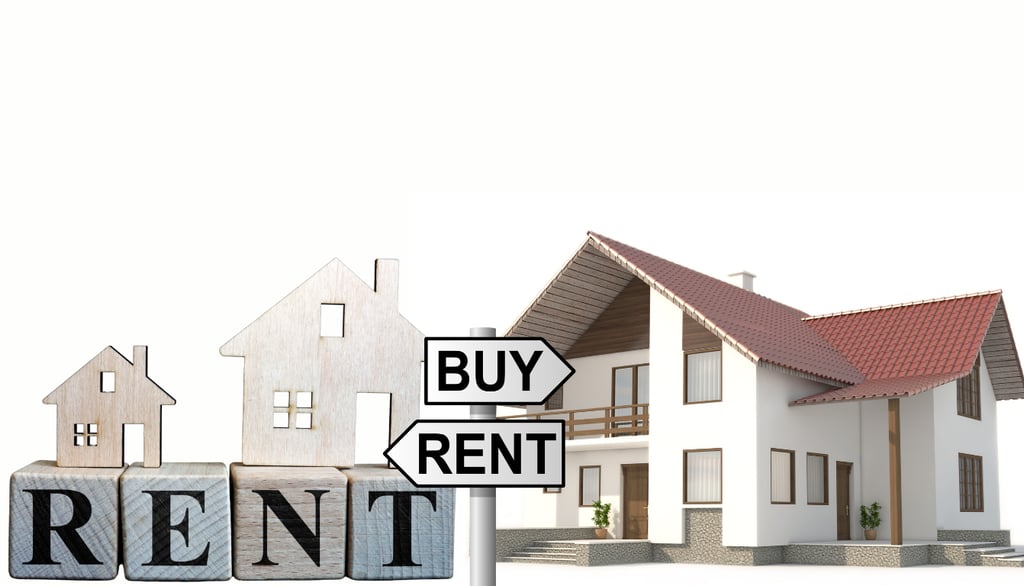Should You Buy Property or Rent in Today’s Market?
One of the most debated financial decisions individuals face is whether to buy a home or continue renting—especially in today’s dynamic real estate market. With property prices fluctuating, interest rates rising, and rental values increasing across urban India, the question becomes more relevant than ever.
flixahdevelopers
8/4/20254 min read


Should You Buy Property or Rent in Today’s Market?
One of the most debated financial decisions individuals face is whether to buy a home or continue renting—especially in today’s dynamic real estate market. With property prices fluctuating, interest rates rising, and rental values increasing across urban India, the question becomes more relevant than ever.
Should you consider purchasing a home or continue renting? The answer isn’t simple—it depends on your financial goals, lifestyle preferences, and market conditions. Let’s break down the pros, cons, and key factors that can help you make the best decision in 2025 and beyond.
1. The Present Real Estate Market in India
Before making a decision, it is essential to comprehend the market conditions.
Property prices have been on the rise in metros and tier-2 cities due to increased demand post-pandemic.
Home loan interest rates are averaging between 8% and 9% (as of mid-2025), a slight rise from previous years.
Rental costs in major cities like Bengaluru, Pune, and Hyderabad have also surged by 15–25% in the last year.
Government incentives (like PMAY) and tax deductions on home loan interest still make buying attractive for salaried individuals.
With that backdrop, let’s explore the benefits and drawbacks of both buying and renting.
2. Advantages of Buying Property
a. Long-Term Investment
Acquiring real estate is regarded as a physical asset that typically increases in value over time. While short-term market corrections happen, most urban properties tend to increase in value over a 10–15 year horizon.
b. Stability & Ownership
Owning a home offers emotional and financial stability. You’re no longer at the mercy of landlords, rent hikes, or non-renewal of lease agreements. It becomes your space to modify, renovate, or build memories in.
c. Tax Benefits
Under Section 80C and Section 24(b) of the Income Tax Act, homeowners can claim deductions on:
Principal repayment (up to ₹1.5 lakh)
Interest on home loans (up to ₹2 lakh)
These deductions can significantly reduce your annual tax liability.
d. Passive Income Potential
If you buy a second property or invest in high-demand locations, it can become a steady source of rental income or even appreciation-led resale profits.
3. Disadvantages of Buying
a. High Upfront Costs
Buying a home requires:
Down payment (typically 10–20%)
Stamp duty and registration (5–7%)
Maintenance fees, brokerage, and furnishing
This can make the initial cost overwhelming, especially for young professionals or first-time buyers.
b. Limited Flexibility
Once you buy a home, especially with a long-term loan, mobility decreases. If your job relocates or you want to explore new cities, you can’t easily pick up and leave.
c. Interest Burden
Over a 20-year home loan, the interest paid often exceeds the principal, making it a costly affair. Rising interest rates in the market can add to this burden.
4. Advantages of Renting Property
a. Lower Monthly Outgo
In many cities, the EMI on a home loan is higher than the rent for a similar property. Renting keeps your monthly expenses low, allowing you to invest or save more.
b. Flexibility
Renting gives you the freedom to move cities, upgrade lifestyles, or downsize depending on life situations—something that's harder to do with a purchased home.
c. No Maintenance Hassles
Most property repairs, taxes, and structural issues are the landlord's responsibility. As a tenant, your liabilities are limited.
d. No Market Risk
By renting, you are protected from the volatility of the real estate market. If property prices fall or interest rates rise, you are unaffected.
5. Disadvantages of Renting
a. No Asset Creation
Rent paid is an expense, not an investment. After years of making rental payments, you possess nothing. Conversely, EMI payments contribute to the equity of your own property.
b. Uncertainty & Lack of Control
Landlords may increase rent, decide to sell, or refuse to renew the lease. This instability can affect your peace of mind.
c. Customization Limitations
Renting means you may not be able to redesign, renovate, or make the home truly your own without the landlord’s permission.
6. Key Factors to Consider Before Deciding
Before you choose between buying and renting, evaluate these factors:
a. Financial Readiness
Do you have a stable income?
Can you afford the down payment and EMIs without compromising your lifestyle?
Have you considered home loan eligibility?
b. Duration of Stay
Planning to stay in a city for 5+ years? Buying may be worth it.
If it’s a temporary move or uncertain job location, renting is safer.
c. Lifestyle Needs
Want to live in a premium location that’s unaffordable to buy? Renting makes sense.
Prefer stability, customization, and pride of ownership? Buying may be better.
d. Investment Perspective
If you're viewing the house as a long-term investment, buying makes financial sense.
But if you'd rather invest your savings in mutual funds, stocks, or business, renting gives more liquidity.
7. Rent vs Buy: A Practical Example
Let’s say you're considering a 2BHK flat in Pune.
Buy: ₹80 lakh property, ₹16 lakh down payment, ₹64 lakh loan
EMI @ 8.5% = ₹55,000/month for 20 years
Maintenance, taxes = ₹5,000/monthRent: Same property for ₹28,000/month
Maintenance covered by landlord
Verdict:
In the short term, renting saves you ₹30,000/month. But in 20 years, the homeowner builds equity and owns an asset. The tenant has spent similar money without ownership.
8. So, Should You Buy or Rent in 2025?
There’s no one-size-fits-all answer. But here’s a quick guide:
Situation Recommended Option You’re financially stable, plan to live long-term Buy You have a transferable job or unsure of future plans Rent You want flexibility and fewer responsibilities Rent You want to build long-term assets and wealth Buy
Final Thoughts
Buying a home is one of the most emotional and impactful financial decisions of your life. In 2025, with rising real estate prices and volatile interest rates, it’s essential to balance both emotional and financial logic.
If you're ready to commit, buying can offer security, pride, and long-term returns. But if your lifestyle demands freedom, flexibility, and lower financial burden, renting is not a bad option either.
Choose what suits your goals—not just what others are doing.
Need help evaluating a property or home loan plan? Or looking to invest in real estate?
Feel free to connect with expert advisors who can guide you based on your unique financial profile.
